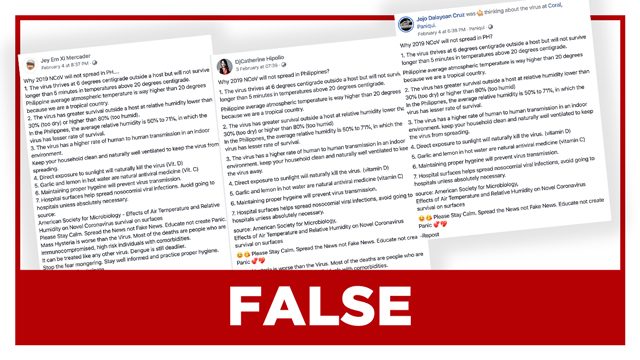SUMMARY
This is AI generated summarization, which may have errors. For context, always refer to the full article.

Claim: Some Facebook posts claim that the novel coronavirus (2019-nCoV) “will not spread” in the Philippines due to the country’s high temperature as well as relatively high humidity.
“The virus thrives at 6 degrees centigrade outside a host but will not survive longer than 5 minutes in temperatures above 20 degrees centigrade,” said the claim.
It added, “The virus has greater survival outside a host at relative humidity lower than 30% (too dry) or higher than 80% (too humid).”
Because the Philippines is a tropical country and has a mid-to-high average relative humidity, the claim said 2019-nCoV has a “lesser rate of survival.”
The post cites “American Society for Microbiology – Effects of Air Temperature and Relative Humidity on Novel Coronavirus survival on surfaces” as its source.

Rating: FALSE
The facts: In an email response to this claim, the World Health Organization (WHO) told Rappler that 2019-nCoV “has spread to countries with both hot and humid climates, as well as cold and dry.”
The WHO then reminded the public to continue practicing proper hygiene to combat the spread of the virus. “Wherever you live, whatever the climate, it is important to follow precautions.”
“Wash your hands frequently and cover coughs and sneezes with a tissue or a bent elbow. Throw the tissue in the bin and wash your hands immediately afterwards,” the WHO said.
A similar fact-check piece by Rappler on February 3 also quoted the WHO and the Department of Health as saying that the climate is not related to the spread of 2019-nCoV.
The WHO reiterated on Tuesday, February 11, that the virus is transmitted either via droplets or close contact.
Meanwhile, the study that the social media posts cited was about the general survivability of coronaviruses on surfaces, not necessarily specific to 2019-nCoV alone.
The study’s full title is “Effects of Air Temperature and Relative Humidity on Coronavirus Survival on Surfaces,” published online by the American Society for Microbiology in 2010. The title does not have the word “Novel,” contrary to how the source was cited in the claim.
The study was meant to assess the risks posed by coronaviruses like SARS on surfaces. However, since there are safety challenges in working with the SARS virus itself, the study used “surrogate coronaviruses” from animals: transmissible gastroenteritis virus and mouse hepatitis virus.
“The use of surrogates for studying the environmental survival of SARS-CoV can increase our understanding of the survival and persistence of this virus on environmental surfaces, the possible role of such surfaces in the transmission of SARS-CoV and other coronaviruses, and the risk posed by contaminated surfaces in outbreak settings,” said the study.
According to the study, the survival data for the two surrogate viruses “suggest that enveloped viruses can remain infectious on surfaces long enough for people to come in contact with them, posing a risk for exposure.” However, it also said that the risk “is still poorly understood, and more work is needed to quantify the risk of exposure and possible transmission associated with surfaces.”
As for 2019-nCoV’s survivability on surfaces, current WHO evidence suggests that it can “survive a few hours,” but that “simple disinfectants can kill the virus, making it no longer possible to infect people.” – Michael Bueza/Rappler.com
Keep us aware of suspicious Facebook pages, groups, accounts, websites, articles, or photos in your network by contacting us at factcheck@rappler.com. Let us battle disinformation one Fact Check at a time.
More fact checks on 2019-nCoV:
- FALSE: Natural ginger ale a ‘cure for coronavirus’
- FALSE: Media didn’t report novel coronavirus has low fatality rate
- FALSE: ‘Photo’ of Japanese medical team sent to Wuhan, China
- FALSE: Novel coronavirus ‘can be cured by garlic’
- FALSE: Coronavirus can be ‘eliminated’ by high temperatures
- FALSE: Novel coronavirus a ‘type of rabies’
- FALSE: ‘Positive’ coronavirus case in Laguna hospital
- FALSE: ‘Patient tested positive’ for 2019-nCoV in Makati Medical Center
- FALSE: Chinese patient in Alabang clinic, hospital tested ‘positive’ for coronavirus
- FALSE: ‘Confirmed cases’ of coronavirus at PBCom Tower in Makati
- FALSE: ‘SARS’ case reported in clinic at Shangri-La Plaza
- FACT CHECK: Misinformation on novel coronavirus that spreads online
Add a comment
How does this make you feel?
There are no comments yet. Add your comment to start the conversation.